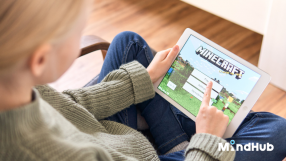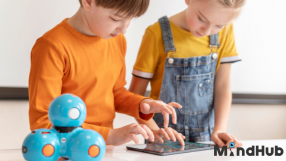
With the growth and development of the Internet space, the available information in it becomes inexhaustible. For the youngest active users, we can even say that they grow up on the Internet. 97% of the children in most developed countries already use the online space as an integral part of their daily lives.
Sometimes this means entertainment and games, but other times - access to information - without control. That is why it is especially important for parents to take the process into their own hands and to optimise the content that their children reach.
Both children and parents need to know that the Internet can have advantages, and if used for its intended purpose, its positive aspects will help the development of children.
During the training, MindHub mentors will be happy to give children valuable advice. And for the parents - we’ll now share methods they can use to help children properly select information on the Internet.
Fake news and untruthful information
Unfortunately, control over the accuracy of the information on the Internet is far from sufficient. This means that we often come across data that may be wrong, fabricated or not entirely correct.
It is important as a parent to spend enough time with your children in front of the devices so that you can help them build habits on how to quickly and effortlessly recognise the fake from the real news and data.
In addition to online sites where information can be misrepresented, people are increasingly being misled by social media. On social media channels, everyone has the right to publish content that, although controlled, is often misrepresented or false.
Georgi Apostolov from the Center for Safe Internet shares: "Among their most popular activities on the Internet is the time spent on social media. They start using them at the age of 7-8. In the age group 9-11, 73% of children are already on social networks, where video content also predominates."
That is why we advise you and your children to develop habits for double-checking the information. Use reliable sites where you can verify what you suspect, and together you will easily begin to recognise false information from reliable information and reduce the likelihood of your child spreading incorrect information.
Sharing personal information
Not only on social media but throughout the whole online space, we often share personal information. Sometimes it is personal and confidential, and the last thing we need is to share it where we shouldn't.
We, adults, are aware of the consequences of this, but children cannot always distinguish the dangers.
Take the time to talk to your children about the unwanted consequences that can occur when sharing personal information. Explain to them why it is important not to publish such data and who they can trust for this.
Be sure that in the process of learning at MindHub, children will be familiar with the subtleties of the Internet and how to use it to their advantage, not harm.
Useful and pleasant go together
The sea of information that is the Internet has the power to help every child's development. If you trust reliable information, the right sources, and at the same time, protect yourself from the hidden pitfalls, then the benefits that can be derived are many.
You lay the groundwork for what the child needs to know - why it's important to be careful. Then we take care of everything else. Showing specific platforms that can be trusted, building healthy habits, and gaining essential and exciting information will lead to the desired positives.
Relying on useful materials and interactive methods to build essential qualities and abilities, your children will be more than ready for the professions of the future. Moreover, they can develop many additional opportunities only by extracting the positives of the Internet.
Remember always to be involved in the process that children go through online so that you can dominate the necessary control over their actions. But at the same time, allow them to draw from the useful information and opportunities that are hidden there.


